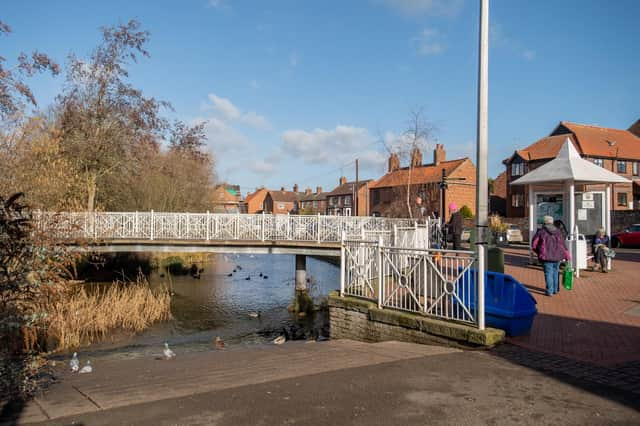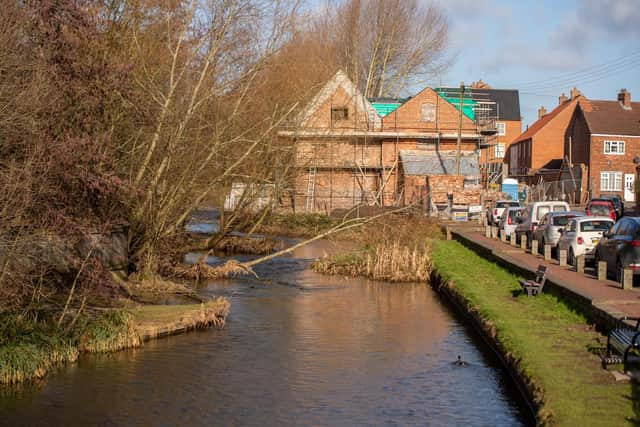Grand plans for Horncastle's Riverscape project launched


After East Mercia Rivers Trust (EMRT) received £199,760 of UK Shared Prosperity Funding for the Horncastle Riverscape Enhancement project last month, the exciting project was officially launched on Thursday (September 7) at Banovallum House, where guests had the opportunity to learn more about the project and how to get involved.
Nearly 50 people attended in person and online to learn about the project, with key speakers included Coun William Gray, East Lindsey District Council’s Horncastle ward member, Dr Ian Marshman of the Horncastle History and Heritage Society, Dr John Henry Looney, owner of Sustainable Directions Limited; Paul Scott of the Sir Joseph Banks Society, and Paige Donnelly of the East Mercia River Trust (EMRT).
Advertisement
Advertisement
Coun Gray said: “Of course there will be a focus on river enhancement, which of course is very important that's what it's all about, but this will also provide other things – volunteering, improving access to heritage, the history of area and of course increased biodiversity, which is very important.”


Paige, the EMRT’s Resilient Rivers Partnerships Manager, presented the plans to the guests which explained the aim of the project – to enhance the natural, cultural, and amenity value of Horncastle’s rivers and the riverside environment for the benefit of residents, biodiversity, tourism, and the economy.
“We want to restore and enhance the natural environment and to upskill people in Horncastle to be able to go out and monitor their river,” Paige said, “We want to reconnect people with culture and heritage, where people can go to Horncastle to learn about river and restore access for people and visitors connecting people to river and what wildlife should be here."
It is hoped, according to the timeline presented to guests, that the project will be competed by summer 2024.
Advertisement
Advertisement
The first stage of the plans will be to restore the natural habitats along the river, Paige explained during the presentation, while the second will see a number of community engagement events and connections to get community involved, to train people to care for their river, and go into school and get scouts involved and target different ages.
Starting this autumn will be River Restoration Work, which will see the first phase of work run along the 200m stretch from Victoria Mill Weir to Bridge Street.
During this initial stage, there will be berms installed, which will be made of natural woody materials to compliment the natural landscape of the river, and river gravel also added to provide more varied habitat, enhance biodiversity and improve the amenity value of the river.
Paige explained: “We are having bespoke habitat designs made, which will include flood modelling and support our application for consent from the Environment Agency.
Advertisement
Advertisement
"We are developing a partnership between EMRT and Horncastle Town Council to monitor the berms as they become established, they eventually become part of the natural environment and require little attention.”
EMRT will also be carrying out invasive species management work along the River Bain next year to remove Himalayan Balsam, which is considered an invasive species to many other plants, as well as putting on training sessions for people to learn all about the invasive plant and how to remove it.
The river enhancement work will be looking at access to the river for canoeists and small craft, turning benches to face the waterways, and adding interactive features.
"The bridges will be factored into later phases, we have started to gather quotes to enable these can be included, and as part of this first phase,” Paige said, “We will be working with Horncastle Together to establish all the needed access features in the town.
Advertisement
Advertisement
"We also want to produce an access feature map, that we can over time deliver as we continue to secure funding.”
To help get children and families involved in the plans, EMRT will also be holding Mayfly in the Classroom, River Bug Hunting, and Water Vole Warrior events over the winter 2023 and spring 2024 in schools to help educate youngsters in the area about their riverscape.
There are also plans to revitalise Horncastle Rivercare group, and train people to be able to identify certain invertebrates species that live in the river as part of Riverfly Monitoring Training to find out how healthy the river is.
Guided Walks are also scheduled to take place after the work is done, where will go into detail about what work has been done.
Advertisement
Advertisement
Coun Gray said: “Of course there will be a focus on river enhancement, which of course is very important that's what it's all about, but this will also provide other things – volunteering, improving access to heritage, the history of area and of course increased biodiversity, which is very important.”
The project’s first Water Quality training session is set to take place this Saturday (September 16), and EMRT are also looking for people to help record footfall data, collecting baseline data to compare with post project data to see if the changes made have encouraged more people to visit the rivers.
This will involve volunteers visiting the river each week at the same day and time, for approximately one to two hours, and all training, materials, and equipment is provided.
If anyone would be interested in taking part, email Paige at [email protected] for more information.